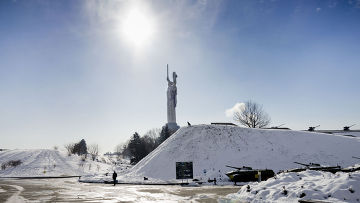
It’s right to honor WW II sacrifices on the eastern front, but not in Moscow in 2015
Kiev is appropriate site for V-E Day ceremony; Ukraine lost an estimated 25% of its population
German Chancellor Angela Merkel and British Prime Minister David Cameron have rightly turned down Vladimir Putin’s invitation to go to Moscow on May 9 to mark the 70th anniversary of the Allies’ victory in Europe, and President Obama may soon follow suit.
————
FOR THE RECORD:
WWII: A March 16 op-ed about this year’s V-E Day commemoration said Ukraine lost 25% of its population in WWII. Ukraine had the second-most casualties in absolute terms, but the 25% loss was in Belarus. —
————
However, there is still a way for Western leaders to attend a commemoration that honors the heroism and sacrifice of the Soviet people during World War II, and Merkel, Cameron and Obama should seize the opportunity because this will be the last major anniversary for so many veterans and other war survivors.
Instead of commemorating V-E Day in Moscow, they should go to Kiev.
It was the combined efforts of the Soviet Union, United States, Britain, France, Canada, Poland and others that defeated Nazi Germany. Many Americans, however, do not appreciate that, for much of the war, the Red Army carried the brunt of the fight against Adolf Hitler’s Wehrmacht. Soviet forces confronted and destroyed far more German divisions than did the Western allies’ armies once they landed in Italy in 1943 and France in 1944.
The Soviet people — Russians, Ukrainians, Belarusians and others — paid a horrible price: an estimated 20 million to 27 million soldiers and civilians killed.
Even though Presidents Clinton and George W. Bush traveled to Moscow in 1995 and 2005 for other V-E Day anniversaries, Moscow in 2015 is hardly the right place for Western leaders to gather now.
Given the conflict that Russia has conducted against Ukraine, Western leaders could not sit in a reviewing stand on Red Square and watch parading Russian troops, whose comrades had so recently waged — and might continue to wage — war in eastern Ukraine, just 500 miles to the south.
Western leaders could not sit in a reviewing stand on Red Square and watch parading Russian troops, whose comrades had so recently waged … war in eastern Ukraine. –
Russian soldiers, without insignia, seized Crimea last March. The following month, they began providing leadership, funding and arms to separatists in Donetsk and Luhansk. In August, regular Russian army units invaded Donetsk and Luhansk to attack Ukrainian forces, which had seemed on the verge of defeating the separatists. Russian soldiers remain in eastern Ukraine.
In recent years, Putin has tried to arrogate for Russia the Soviet Union’s victory in World War II. That understandably angers Ukrainians and others in the post-Soviet space, whose parents and grandparents also fought, suffered and died in great numbers.
No one should dispute the role played by Russians in the war or that Russians made up the largest number of Soviet war dead. Ukraine bore the second-most casualties in absolute terms but, on a proportional basis, it suffered more than Russia, losing an estimated 25% of its population during the war.
Kiev offers a logical alternative to Moscow for V-E Day. Western diplomats and the Ukrainian government could structure a ceremony without a parade of war materiel (the Ukrainians don’t seem to have a penchant for reviewing tanks and rockets). And the events could be designed to remember the losses suffered by all the Soviet people. Ukrainian veterans groups could, for example, invite veterans from Russia and the other post-Soviet states.
Not far from the city center in Kiev are memorials to the 13 Soviet hero cities of World War II. Western leaders could salute the sacrifices of the soldiers and citizens of Moscow and Leningrad (now St. Petersburg); of the Belarusian capital of Minsk; and even of Sevastopol, which is part of Crimea, illegally annexed by Russia one year ago.
Marking the May 9 anniversary in Kiev would allow Obama, Merkel, Cameron and other leaders to pay homage and respect to the millions who fought so bravely and died in stopping Hitler’s war machine on the eastern front. But they could do so on their terms, not Putin’s.
Gathering in the Ukrainian capital would also send a powerful message to the Russian populace of the isolation of their country’s leader because of his aggression against Ukraine. Let the Kremlin propagandists try to hide the sight of Western leaders in Kiev respectfully honoring the heroic World War II struggle of the Soviet people, including Russians.
Steven Pifer is a senior fellow at the Brookings Institution. John Herbst is the director of the Dinu Patriciu Eurasia Center at the Atlantic Council. Bill Taylor is the acting executive vice president at the United States Institute of Peace. All three are former U.S. ambassadors to Ukraine.
http://www.latimes.com/opinion/op-ed/la-oe-0316-pifer-ve-day-kiev-moscow-20150316-story.html

 April 1, 2015
April 1, 2015  Опубликовано в
Опубликовано в